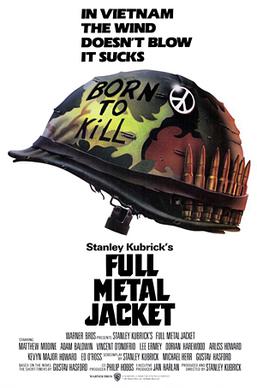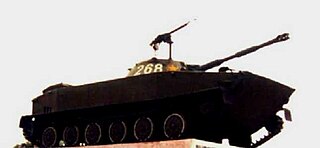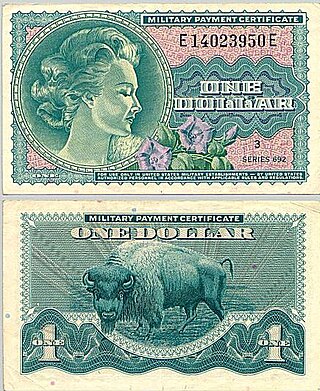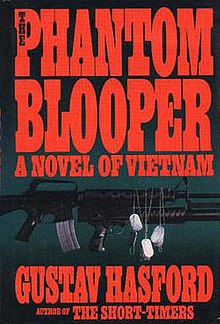
Full Metal Jacket is a 1987 war drama film directed and produced by Stanley Kubrick, who also cowrote the screenplay with Michael Herr and Gustav Hasford. The film is based on Hasford's 1979 novel The Short-Timers and stars Matthew Modine, R. Lee Ermey, Vincent D'Onofrio and Adam Baldwin.

The Tet Offensive was a major escalation and one of the largest military campaigns of the Vietnam War. The Viet Cong (VC) and North Vietnamese People's Army of Vietnam (PAVN) launched a surprise attack on January 30, 1968 against the forces of the South Vietnamese Army of the Republic of Vietnam (ARVN), the United States Armed Forces and their allies. It was a campaign of surprise attacks against military and civilian command and control centers throughout South Vietnam. The name is the truncated version of the Lunar New Year festival name in Vietnamese, Tết Nguyên Đán, with the offense chosen during a holiday period as most ARVN personnel were on leave. The purpose of the wide-scale offensive by the Hanoi Politburo was to trigger political instability in a belief that mass armed assault on urban centers would trigger defections and rebellions.

The Battle of Khe Sanh was conducted in the Khe Sanh area of northwestern Quảng Trị Province, Republic of Vietnam, during the Vietnam War. The main US forces defending Khe Sanh Combat Base (KSCB) were two regiments of the United States Marine Corps supported by elements from the United States Army and the United States Air Force (USAF), as well as a small number of Army of the Republic of Vietnam (ARVN) troops. These were pitted against two to three divisional-size elements of the North Vietnamese People's Army of Vietnam (PAVN).

Jerry Gustave Hasford, also known under his pen name Gustav Hasford, was an American novelist, journalist and poet. His semi-autobiographical novel The Short-Timers (1979) was the basis for the film Full Metal Jacket (1987). He was a United States Marine Corps veteran, who served as a war correspondent during the Vietnam War.

The Battle of Lang Vei began on the evening of 6 February 1968 and concluded during the early hours of 7 February, in Quảng Trị Province, South Vietnam. Towards the end of 1967, the 198th Tank Battalion of the People's Army of Vietnam's (PAVN) 202nd Armored Regiment received instructions from the North Vietnamese Ministry of Defense to reinforce the 304th Division as part of the Route 9–Khe Sanh Campaign. After an arduous journey down the Ho Chi Minh trail in January 1968, the 198th Tank Battalion linked up with the 304th Division for an offensive along Highway 9, which stretched from the Laotian border through to Quảng Trị Province. On 23 January, the 24th Regiment attacked the small Laotian outpost at Bane Houei Sane, under the control of the Royal Laos Army BV-33 "Elephant" Battalion. In that battle, the 198th Tank Battalion failed to reach the battle on time because its crews struggled to navigate their tanks through the rough local terrain. However, as soon as the PT-76 tanks of the 198th Tank Battalion turned up at Bane Houei Sane, the Laotian soldiers and their families retreated into South Vietnam.

The Green Berets is a 1968 American war film directed by John Wayne and Ray Kellogg, and starring Wayne, David Janssen and Jim Hutton, based on the 1965 novel by Robin Moore. Much of the film was shot in the summer of 1967. Parts of the screenplay bear little relation to the novel, although the portion in which a woman seduces a North Vietnamese communist general and sets him up to be kidnapped by Americans is from the book.

"Khe Sanh" is the debut single by Australian rock band Cold Chisel, released in May 1978 as a 45 rpm single, and named after the district capital of Hướng Hóa District, Quảng Trị Province, Vietnam. Written by pianist Don Walker, "Khe Sanh" concerns an Australian Vietnam veteran dealing with his return to civilian life. According to Toby Creswell's liner notes for the band's 1991 compilation album Chisel, the song is also a story of restless youth.

Dale Adam Dye Jr. is an American actor, technical advisor, radio personality and writer. A decorated Marine veteran of the Vietnam War, Dye is the founder and head of Warriors, Inc., a technical advisory company specializing in portraying realistic military action in Hollywood films. Dye has also offered his expertise to television, such as the HBO miniseries Band of Brothers and The Pacific, the Apple TV+ miniseries Masters of the Air, and video games, including the Medal of Honor series.
The following outline is provided as an overview of and topical guide to the Vietnam War:
A blooper is a mistake made on television or in film.

The Short-Timers is a 1979 semi-autobiographical novel by U.S. Marine Corps veteran Gustav Hasford, about his experience in the Vietnam War. Hasford served as a combat correspondent with the 1st Marine Division during the Tet Offensive of 1968. As a military journalist, he wrote stories for Leatherneck Magazine, Pacific Stars and Stripes, and Sea Tiger. The novel was adapted into the film Full Metal Jacket (1987), co-scripted by Hasford, Michael Herr, and Stanley Kubrick.
Michael David Herr was an American writer and war correspondent, known as the author of Dispatches (1977), a memoir of his time as a correspondent for Esquire (1967–1969) during the Vietnam War. The book was called "the best book to have been written about the Vietnam War" by fellow author C.D.B. Bryan in his review for The New York Times Book Review. Novelist John le Carré called it "the best book I have ever read on men and war in our time."

Military payment certificates, or MPC, was a form of currency used to pay United States (US) military personnel in certain foreign countries in the mid and late twentieth century. They were used in one area or another from a few months after the end of World War II until a few months after the end of U.S. participation in the Vietnam War – from 1946 until 1973. The certificates were made by line lithography to create colorful banknotes that could be produced cheaply.

Operation Niagara was a U.S. Seventh Air Force close air support campaign carried out from January through March 1968, during the Vietnam War. Its purpose was to serve as an aerial umbrella for the defense of the U.S. Marine Corps Khe Sanh Combat Base on the Khe Sanh Plateau, in western Quang Tri Province of the Republic of Vietnam. The base was under siege by an estimated three-divisional force of the People's Army of Vietnam (PAVN).

The Hill Fights took place during the Vietnam War between the People's Army of Vietnam (PAVN) 325C Division and United States Marines on several hill masses north of the Khe Sanh Combat Base in northwest Quảng Trị Province.

Michael John Fitzmaurice is a former United States Army soldier and a recipient of the United States military's highest decoration, the Medal of Honor, for his actions during the Vietnam War.
The Battle of Ban Houei Sane took place during the Vietnam War, beginning on the night of 23 January 1968, when the 24th Regiment of the People's Army of Vietnam (PAVN) 304th Division overran the small Royal Lao Army outpost at Ban Houei Sane. The fighting at Ban Houei Sane was one in a series of battles fought between North Vietnamese and Allied forces during the Tet Offensive. The small outpost, defended by the 700 man Bataillon Volontaire (BV-33), was attacked and overwhelmed by the vastly superior PAVN and their PT-76 light tanks. The failure of BV-33 to defend their outpost at Ban Houei Sane had negative consequences only a few weeks later, when the PAVN struck again at Lang Vei.

A Gypsy Good Time is a 1992 noir detective novel by Vietnam War veteran Gustav Hasford and the last novel he completed before his death in 1993, at forty-five years old. It is written in the style of classic hardboiled detective fiction and was poorly received by book critics at the time for making too much use of the cliches of the genre. A Gypsy Good Time never received the same critical recognition as Hasford's novels on Vietnam, The Short-Timers (1979) and The Phantom Blooper (1990), and is relatively unknown even among the author's followers. The book is reportedly based on Hasford's disillusionment with Hollywood during the production of Full Metal Jacket (1987).

Phu Bai Combat Base is a former U.S. Army and U.S. Marine Corps base south of Huế, in central Vietnam.















